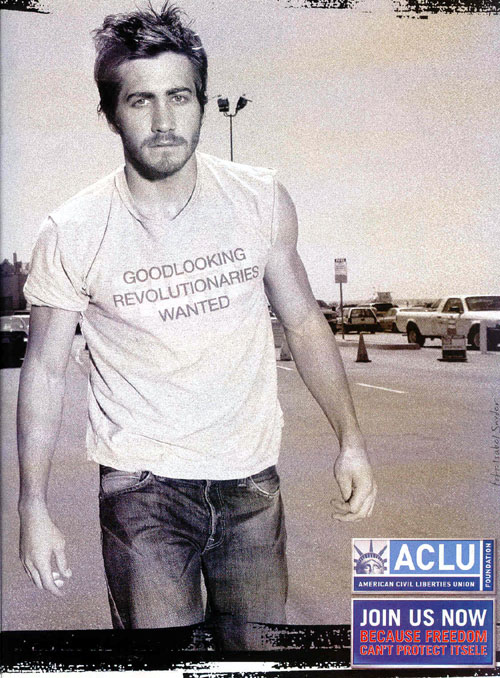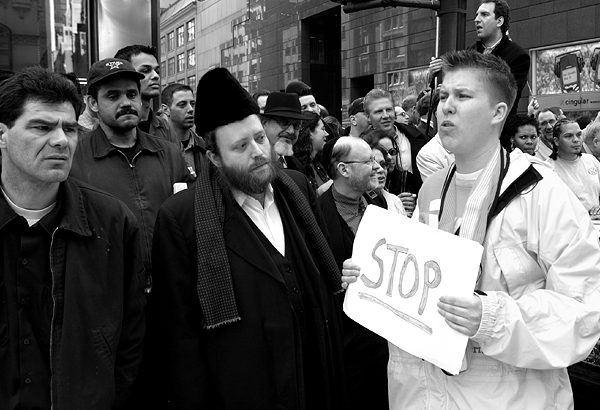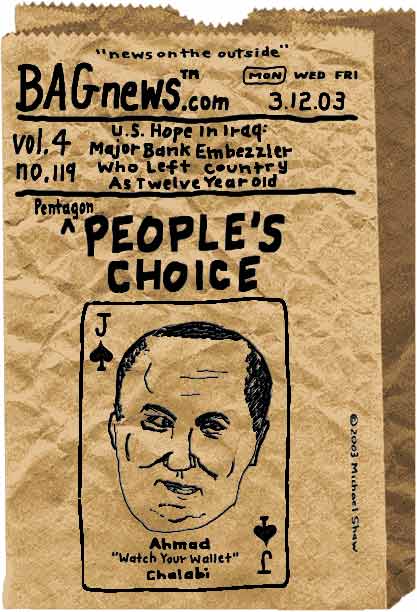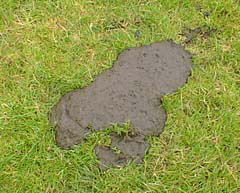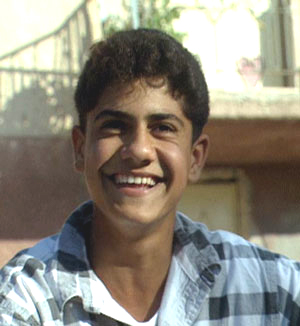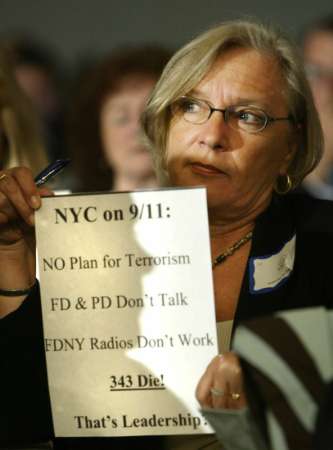
A woman holds a sign in protest as she listens to testimony by former New York City Mayor Rudolph Giuliani at a public hearing of the National Commission on Terrorist Attacks Upon the United States in New York City, May 19, 2004.
Just wish we could forget him.
I'd lay off the guy by now if it weren't for the fact that Rudy Giuliani still appears to be revered around the world as some kind of hero. Jimmy Breslin might also have been able to move on, but it clearly ain't happening yet. Giuliani is a fake, and that may actually be the best that can be said of him.
The day after the 9/11 Commissioners had preposterously annointed him during his appearance before them in New York the veteran Newsday columnist brought his readers back to reality. I'm linking to and copying part of his column here, because almost everyone out in the ether has heard of our former mayor, but fewer get to read Breslin.
He was a nowhere guy until the planes hit the World Trade Center buildings. He was a failed mayor, was Rudy Giuliani. He had a commissioner named Harding stealing so obviously that at first people couldn't believe their eyes.
Giuliani had an open fear of blacks that produced the one most memorable sight of the last 10 years in my city.
On the roof of City Hall were cops with rifles. They were ready to rake this small, straggly column of people marching on one strip of Broadway while they pleaded for housing. Many had AIDS and needed assistance. The real trouble with the demonstrators was that some of them were not white.
On the street, the cops aimed cameras at the cripples. On the roof, they aimed rifles at the marchers.
This was Rudy Giuliani's paranoia caused by this raggedy group of demonstrators begging for a roof over their poor heads. In his time in City Hall, there was a person of color once in awhile. If two appeared, the SWAT team was put on alert.
Giuliani ran a city of aimless departments, of tax assessors shaking people down, of correction officers bullying people in campaigns, of an illness being used for publicity, of so much golf with a lobbyist that they called him the Commissioner of Golf, of so many strutting around and snarling at the helpless and the powerless, using Giuliani's name as a baseball bat. And always, everybody fearing and shunning blacks. Crime had dropped in his first term. It had dropped all over the country, but he made it seem like it was only his doing. "My crime decrease."
He wanted an exhibit at the Brooklyn Museum closed because it offended his strict Catholicism. And then, with a wife in Gracie Mansion and one girlfriend in a car outside, a friend of mine, a detective, drove in with another girlfriend, and he and the other girlfriend's car nearly hit each other. He marched with his girlfriend in a parade and his kids could watch it on television.
Giuliani wanted a high security bunker, placed 23 stories high in a building at 7 World Trade Center. Anybody with the least bit of common sense knew that the bunker in the sky was insane and the price, $15.1 million, a scandal. But he said it would house "My Police Commissioner" and "My Fire Commissioner." In Giuliani's world, everything was "mine."
And on the morning of Sept. 11, Rudy Giuliani's bunker went out into the air like a Frisbee.
The first thing he did, he was telling the 9/11 Commission yesterday, was to go out and search for a new command post. He walked away from the trade center and headed for the command post that made his career: the nearest television camera.
. . . .
He went on the television. He was good. What was he supposed to be, bad? He was talking to the world from a city of catastrophe. He went on television five or six times that day. He went on more the next day. And the day after that, and for all the days of the fall of 2001, and the television made him an international hero.
. . . .
And yesterday he sat before the 9/11 commissioners and they collapsed in awe. They listened to him give a walking tour of how he tried to find a command center. Not once did anybody ask him about the stupid idea he had had for his first bunker, the one that fell out of the sky. They asked no questions of a mayor whose fire department had no radios that worked when a police helicopter said the north tower was going to fall. And 343 firefighters died. They wanted to hear nothing of blood on Giuliani's hands. They only wanted to hear whatever he had to say and they regarded his words as those of a hero. They had no idea that the guy was a flop who got lucky with an air raid.
They could at least have asked him a few real questions, and they definitely should have listened to the people who had had to share New York with him before September 11, especially the relatives of World Trade Center victims who sat in the same room with the former mayor on Wednesday. They were
not happy.
Several relatives of victims said they were disgusted that the 10 members of the commission, each allowed about five minutes to question Giuliani, wasted time with redundant praise. One statement thanking Giuliani should have been enough, the families said.
"The commission members don't press hard at all," said Beverly Eckert, whose husband was killed.
"We leave frustrated," said Monica Gabrielle, whose husband was killed. "They made a huge faux pas in letting Rudy Giuliani polish his crown."
Targeting Giuliani is a reversal for many of the victims' relatives, who in the years since the attack have generally praised him as a steady leader through the chaos. After leaving office at the end of 2001, Giuliani has consistently sided with family coalitions on issues involving the trade center site, once even calling for the entire 16 acres to become a memorial.
[image and caption from REUTERS/Peter Morgan]
